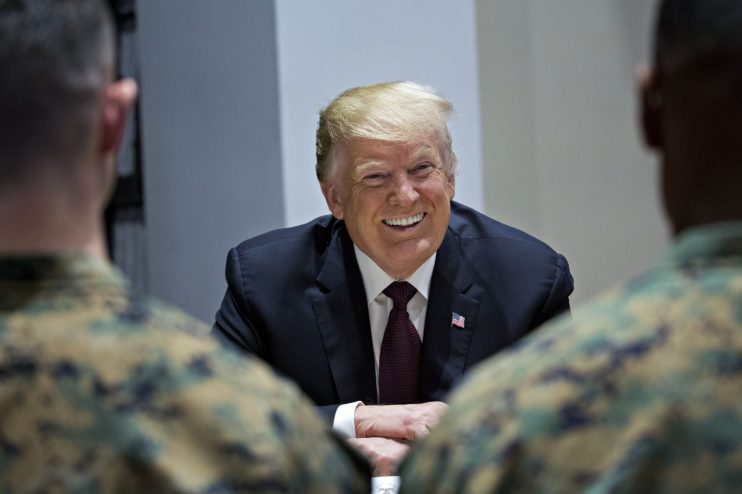Love him or hate him, Trump is right to wind down America’s endless wars

In my last book, To Dare More Boldly: The Audacious Story of Political Risk, each chapter represents a key precept, based on a specific historical story, as to how to do political risk analysis right.
One of my favourite of these 10 commandments is what I term “the Losing Gambler’s Syndrome”.
This directly relates to today, and the frantic excuses the American foreign policy blob is pathetically throwing in the way of Donald Trump’s last-minute efforts to wind down the endless wars in Iraq and especially Afghanistan.
The Losing Gambler Syndrome is a fact of the human condition that casino magnates have come to well understand. When someone loses big at the tables, they have an overwhelming urge to invest ever more resources to make good on their catastrophic losses, rarely bothering to think about the reasons for these losses in the first place.
Dad cannot go back to Mom telling her he has lost the kids’ college fund at the roulette table, so he keeps playing… and keeps losing. The reason for his demise — the terrible odds — is never analytically addressed.
I saw this doleful process up close and personal in Washington as the Iraq War slid toward the abyss. Very often those policymakers urging ever greater efforts there privately admitted to me that they did so largely to make good on their already monumental strategic losses.
I pointed out that emotionally doubling down on a bad strategic assessment in order to wipe the slate clean of one’s intellectual mistakes — saving career and reputation — is a terrible way to make foreign policy.
But it happened, and continues to happen, as increasingly feeble excuses are now put forward by a Washington foreign policy elite which is desperate to avoid being held to account over the colossal failure of the America’s endless wars, lest the odium from them constrain the US from fighting wars of choice in the future.
As regular readers of this column well know, I am incandescent with rage at the puerile post-electoral temper tantrum to which President Trump is subjecting us all, nakedly putting his own interests — as so many of us feared — ahead of the interests of both the American Republic and its people. But, in keeping faith with his Jacksonian base over his promise to wind down the forever wars, Trump is actually performing a public service, even if his motivation is also revenge at the Washington establishment that so loathed him.
After peremptorily firing defence secretary Mike Esper, a bitter-ender who wants to keep American troops in both Afghanistan and Iraq indefinitely, Trump has announced plans to cut troop sizes in both to merely 2,500 by January 15, 2021 — this is down from the 4,500 soldiers presently stationed in Afghanistan and the 3,000 in Iraq — just five days before the inauguration of Joe Biden.
What on its surface amounts to a minor troop withdrawal has caused a frenzy of denunciation from the foreign policy elite, which is itself operationally very odd. During the Obama administration, America had almost 100,000 troops in Afghanistan, yet still could not manage to defeat the Taliban. What does it matter now if the US has 4,500 troops there or 2,500?
The surface answer, parroted by the usual interventionist suspects in both parties, is that to fully leave would send America’s arch-foe the Taliban the signal that, without US support, the fragile regime in Kabul cannot militarily or politically stand on its own two feet and that the country could now be completely overrun by America’s enemies. This, of course, is entirely true.
But at this point, it is time for all of us to employ just a shred of logic in thinking this through. If, after spending an eye-watering $822bn–$1 trillion in Afghanistan over the last generation, a stable indigenous government does not have the magic elixir of local political legitimacy, it is a safe bet that it never will. The Kabul government is nothing other than a US puppet, and the country itself is merely a hideously expensive American colony.
As this is so obvious, the strategic options are clear and binary: either the US is determined to properly colonize the place, staying forever, or it is past time to go and cut its massive, tragic losses of both blood and treasure. This is especially true now that, in direct talks with the Taliban, America’s enemies have agreed (on pain of being re-invaded) to not harbour terrorists inimical to US interests — the only strategic reason for the intervention in the first place.
But the interventionist blob wishes to stay on, as the obvious penalty for literally decades of foreign policy malpractice would be, with the victory of the Taliban, suddenly clear to the world’s public. Careers would be halted, blame rightly affixed — and, most importantly, wars of choice would be even further discredited with the American public than they already are (see the John C. Hulsman Enterprise’s/Public First poll on Americans’ reluctance to fight wars).
The American elite has been playing — and losing — at the roulette table of nation-building and fighting wars of choice for fully two decades. It is way past time for Dad to go home to Mom, admit his disastrous gambling addiction, and pay the piper for his recklessness.
Main image credit: Getty